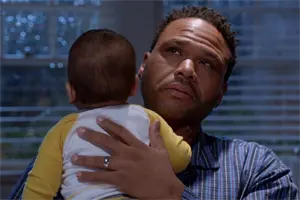Black-ish's lost 2018 episode feels even more powerful in 2020
-

"It's easy to wonder which moment ABC found so objectionable about the episode that it was unceremoniously yanked from the schedule," Kelly Lawler says of the shelved February 2018 "Please, Baby, Please" episode that was finally released on Hulu Monday at creator Kenya Barris' request. "Was it the image of the Shady King throwing paper towels down at his Black and brown subjects, as Trump did when distributing rolls in Puerto Rico in the aftermath of Hurricane Maria? Was it Dre drawing direct parallels from a racist backlash to President Barack Obama's election to Trump's ascendancy? Was it just that, back in 2018, corporations weren't posting Instagram graphics declaring that Black lives actually do matter?" Lawler adds: "'Please Baby' is Black-ish at its best. No current TV series so succinctly – and with so much nuance – deconstructs hot-button issues like (Colin) Kaepernick's protests or explains why Black pride is OK and white pride isn't, in the historical context of slavery and racism. And while the episode is meant to teach, it never lectures or scolds. It has a point of view, certainly, but it also lays out facts and asks the viewer to pick them up, learn from them and grow into someone better. There is fear here, but also comfort, and a reminder that family offers hope." Lawler says "Please, Baby, Please" is especially resonant 2-and-1/2 years later: "This cultural moment feels disturbingly apt for the episode," says Lawler. There is also something achingly sad watching it during the coronavirus pandemic, and after the nationwide protests against police brutality and racism became larger than ever after the death of George Floyd. 'Please Baby' takes on the collective anxieties of many Americans in 2018, and two years later, amid a global crisis none of us saw coming, they are not even close to being solved. We may be no closer to solving our issues in 2020, but if 'Please, Baby, Please' offers anything, it's a reminder that hiding our problems won't make them go away."
ALSO:
- "Please, Baby, Please" looks like lost innocence because it's a snapshot of a comparatively “better” time: There's a heartbreak in watching Black-ish's shelved February 2018 episode in August 2020. "It captures a sense of anxiety that was profound and an America that looked like a disaster to many in 2018," says Jen Chaney. "But it’s also a snapshot of a comparatively 'better' time when we could not imagine how much worse things would get. That makes the conclusion of this episode, which expresses the sort of optimism that we tend to expect from family-oriented, broadcast-network sitcoms, register as the sounding of an alarm. If, in 2020, we look back at a politically panicked half-hour of television as a mark of lost innocence, imagine how 2020 could seem in 2022."
- A reminder that "Please, Baby, Please" was benched during a time when ABC was trying to appeal to Trump voters: "I wondered briefly if 'Please, Baby, Pleas' got booted because it violated an old network TV rule of never establishing main characters’ preferred political party," says Darren Franich. "But ABC was also just weeks away from relaunching Roseanne, a megahit revival whose premiere clearly delineated which characters voted for Trump and who voted for Jill Stein. Roseanne, of course, got killed into The Conners after Roseanne Barr’s racist-tweet scandal. That all happened while 'Please, Baby, Please' languished in purgatory: You blew it, ABC. Worth noting that the black-ish kerfuffle occurred as the network was developing The Kids Are Alright and Schooled, two sitcoms set in the ‘70s and the ‘90s. Take a trip to glorious Pastville, with no possibility of people addressing current events! One season and two seasons, respectively: You blew it, ABC."
- “Please, Baby, Please" is about as polite and reasonable a case against Trump as possible: "Now that I’ve seen 'Please, Baby, Please,' it’s obvious why the creator departed," Joe Berkowitz says of Kenya Barris. "The lost episode is an elegant depiction of a successful suburban Black family’s concerns in late 2017, and it’s about as polite and reasonable a case against Trump as possible. By 2020 standards, it comes across as utterly tame. If this wasn’t sufficiently defanged and both-sidesy enough for ABC, perhaps nothing would be."
- Ultimately, “Please, Baby, Please” centers on Dre grappling with how to explain complicated issues to his children: "In that way, the episode follows the tradition of 'Hope,' the sitcom’s groundbreaking episode about police brutality, and 'Juneteenth,' which made the case for celebrating the day enslaved Black people in Texas finally learned they were free — years before the holiday became a national talking point," says Bethonie Butler. "And like those episodes, 'Please, Baby, Please' ends on a hopeful note."
- Watching "Please, Baby, Please," reflects more on the misguided timidity of ABC that balked at airing it than the episode itself
TOPICS: Black-ish, ABC, Hulu, Kenya Barris, African Americans and TV, Trump Presidency
More Black-ish on Primetimer:- Can Grown-ish Season 5 Solve TV's College Problem?
- 2022 Emmy Preview: Best Actor in a Comedy Promises to Be a Battle of the Titans
- Black-ish helped rewrite how TV comedies talked about race, culture and families of color
- TV Today: Black-ish Says Goodbye After 8 Seasons — With an Assist From Simone Biles
